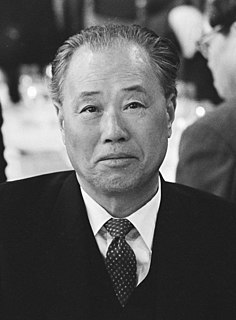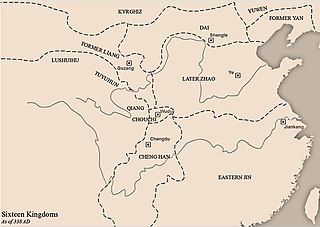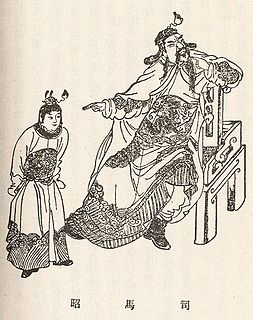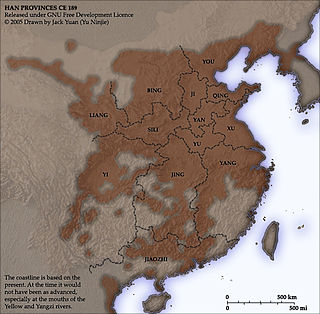Wang Zhao may refer to:
Wang Zhao may refer to:

Zhao Ziyang was a Chinese politician. He was the third premier of the People's Republic of China from 1980 to 1987, vice chairman of the Chinese Communist Party (CCP) from 1981 to 1982, and CCP general secretary from 1987 to 1989. He was in charge of the political reforms in China from 1986, but lost power in connection with the reformative neoauthoritarianism current and his support of the 1989 Tiananmen Square protests.

Emperor Wu of Jin, personal name Sima Yan, courtesy name Anshi (安世), was the grandson of Sima Yi, nephew of Sima Shi and son of Sima Zhao. He became the first emperor of the Jin dynasty after forcing Cao Huan, last emperor of the state of Cao Wei, to abdicate to him. He reigned from 266 to 290, and after conquering the state of Eastern Wu in 280, was the emperor of a reunified China. Emperor Wu was also known for his extravagance and sensuality, especially after the unification of China; legends boasted of his incredible potency among ten thousand concubines.
Emperor Huai of Jin, personal name Sima Chi (司馬熾), courtesy name Fengdu (豐度), was an emperor of the Jin Dynasty (266–420).

The Former Liang was a dynastic state, one of the Sixteen Kingdoms, in Chinese history. It was founded by the Zhang family of the Han ethnicity. Its territories included present-day Gansu and parts of Ningxia, Shaanxi, Qinghai and Xinjiang.

Sima Zhao, courtesy name Zishang, was a Chinese military general, politician, and regent of the state of Cao Wei during the Three Kingdoms period of China.
The grand chancellor, also translated as counselor-in-chief, chancellor, chief councillor, chief minister, imperial chancellor, lieutenant chancellor and prime minister, was the highest-ranking executive official in the imperial Chinese government. The term was known by many different names throughout Chinese history, and the exact extent of the powers associated with the position fluctuated greatly, even during a particular dynasty. During the Six Dynasties period, the term denoted a number of power-holders serving as chief administrators, including zhongshun jian, zhongshu ling, shizhong, shangshu ling and puye.
Shi Le, courtesy name Shilong, formally Emperor Ming of (Later) Zhao, was the founding emperor of the Jie-led Later Zhao dynasty of China. At a young age he was sold as a slave by Jin officials, but he later helped start a rebellion and eventually became a powerful general for the Xiongnu-led Han Zhao dynasty, conquering most of northern China in Han Zhao's name but holding the territory under his own control. In 319, after a dispute with the Han Zhao emperor Liu Yao, he broke away from Han Zhao and formed his own state, Later Zhao, and in 329 he captured Liu Yao and conquered Han Zhao, adding western China to his empire as well.

Romance of the Three Kingdoms is a Chinese television series adapted from the classical 14th century novel of the same title by Luo Guanzhong. The series was produced by China Central Television (CCTV) and was first aired on the network in 1994. It spanned a total of 84 episodes, each approximately 45 minutes long. One of the most expensive television series produced at the time, the project was completed over four years and involved over 400,000 cast and crew members, including divisions of the People's Liberation Army from the Beijing, Nanjing and Chengdu military regions. Some of the dialogues spoken by characters were adapted directly from the novel. Extensive battle scenes, such as the battles of Guandu, Red Cliffs and Xiaoting, were also live-acted.

You Prefecture or YouProvince, also known by its Chinese name Youzhou, was a prefecture (zhou) in northern China during its imperial era.
Yang Dong, known in traditional histories by his princely title of Prince of Yue (越王) or by his era name as Lord Huangtai (皇泰主), posthumous name Emperor Gong (恭皇帝), courtesy name Renjin (仁謹), was an emperor of the Chinese Sui dynasty. During the disturbances that permeated throughout the Sui state late in the dynasty's history, his grandfather Emperor Yang left him in charge of the eastern capital Luoyang, and after Emperor Yang was killed by the general Yuwen Huaji in 618, the Sui officials in Luoyang declared Yang Dong emperor. However, soon one of those officials, Wang Shichong, seized power, and in 619 had Yang Dong yield the throne to him, ending Sui. Soon, he was killed on Wang's orders.
The 12th Central Committee of the Chinese Communist Party was in session from September 1982 to November 1987. It held seven plenary sessions. It was securely succeeded by the 13th Central Committee.
Wu Wang may refer to:

Three Kingdoms is a 2010 Chinese television series based on the events in the late Eastern Han dynasty and the Three Kingdoms period. The plot is adapted from the 14th century historical novel Romance of the Three Kingdoms and other stories about the Three Kingdoms period. Directed by Gao Xixi, the series had a budget of over 160 million RMB and took five years of pre-production work. Shooting of the series commenced in October 2008, and it was released in China in May 2010.
Wang Yi may refer to:
Wang Yi was a Chinese military general and warrior from the Three Kingdoms period. She was the wife of Zhao Ang, an official who lived during the late Eastern Han dynasty and was aligned with the faction that would later become the state of Wei during the Three Kingdoms period. She is known as the heroic woman for her morally upright character and for fighting alongside her family and the Wei Kingdom in various conflicts with the warlord Ma Chao in the 210s.

Zhao Dezhao (趙德昭) was an imperial prince of the Chinese Song Dynasty.
Empress Jin (靳皇后/金皇后) may refer to one of the following Chinese empresses:

God of War, Zhao Yun, also known as Chinese Hero Zhao Zilong, released under the title Dynasty Warriors in Indonesia, is a 2016 Chinese television series directed by Cheng Lidong and produced by Zhejiang Yongle Entertainment Co., Ltd. The series starred cast members from mainland China, South Korea and Taiwan: Lin Gengxin, Im Yoon-ah and Kim Jeong-hoon. The story is loosely adapted from the 14th-century Chinese classical novel Romance of the Three Kingdoms, with Zhao Yun as the main character. It was first aired on Hunan TV from 3 April to 7 May 2016.
Consort Jin may refer to: